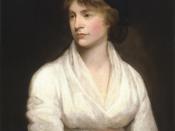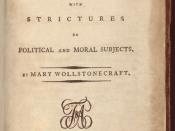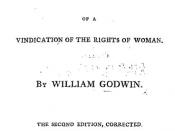Mary Wollstonecraft is credited as the founder of modern European feminism. While the age of Enlightenment advocated freedom and equality over faith and worship, it also created a double standard by not providing the same opportunities and rights for women. Mary Wollstonecraft felt this was a result of social training imposed on women and sought to change the vision of women being inferior. Through A Vindication of the Rights of Woman, she wanted to see the creation of equal and quality educational opportunities for women so that they could advance themselves.
Mary Wollstonecraft criticizes the educational opportunities for women focused upon maintaining superficial appearances. She feels that early education, primarily by example, leads women to their consummation of physical desirability and concern for love. She attributes this education by example to the conditioning of their mothers who teach them how to attract a man. Character flaws arise such as deception and weakness, and are praised rather than discouraged.
Being dependent, manipulative, and beautiful were taught as the ideal qualities to strive for. This "teaching by example", according to Wollstonecraft, is a disorderly means of education for women and prevents them from ever learning the skill of scientific observation - every day repeats itself by completing monotonous tasks to please her husband. Since women are conditioned to be dependent, learning is viewed as secondary and therefore prevents them from seeking knowledge and gaining clear judgment. Maintaining beauty is of utmost importance. By focusing on life and manners, women do not have the opportunities available to them to "think out of the box" and think about the causes of behavior as opposed to "just doing it." Just as the body tires from lack of exercise, Mary Wollstonecraft feels that the reasoning abilities of women are not exercised properly.
One influential work on...


